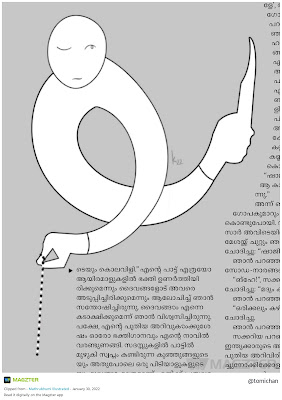Where are our Writers?
 |
| Illustration from Mathrubhumi |
The latest short story of
celebrated Malayalam writer Zachariah raises some vital questions about the role
of writers as well as religionists in contemporary India. Titled ‘Devotional
Poet’, the story appeared in Mathrubhumi [Jan 30-Feb 05]. The
protagonist is a young man who ekes a living by singing devotional songs. But
his livelihood is suddenly brought to an end by contemporary religious zealots
who ask him, “Aren’t you ashamed to sit and sing songs while our religion is
under attack?” His soothing devotion is replaced by a frenzy pretending to be
devotion. “Can you hear?” a friend asks the poet. “There is music in the war cry
of the religionists. It is the rhyme of maddened devotion.”
Maddened
devotion replaces genuine devotion in Hinduism, Islam and Christianity. The
devotional poet gets an opportunity to perform in Delhi, “the spiritual academia
of Indians now.” Shouldn’t the protagonist learn a new lesson from this great
academia? The question is asked by a group of writers including O V Vijayan
(now no more), Gopakumar, and Zachariah himself. Zachariah is a character in
the story and quite a villainous one too. He perverts the devotional poet by forcing
him to drink Old Monk.
Old Monk
becomes the Poet’s constant companion after that. There is an intoxication in
it that devotion cannot provide in today’s India. Devotion is frenzy today. Writers
are intoxicated. Politicians are thugs. Who will redeem India?
Once upon a
time writers were intellectual leaders. They brought truths to people. They
questioned injustices and wrongs. Today?
They are
bought off. By the government. A government which spends Rs2500 crore a year on
advertisements has bought off writers. A government which gets writers arrested
on sedition charges. A government that kills writers sotto voce. A government whose
courts of justice peddle injustice. A government whose universities teach falsehood, whose police are raiders, whose monuments are sham….
Zachariah’s
protagonist becomes a fortune teller in the end.
We are all
fortune-seekers now. One way or another. Even our writers are, alas!
Hari OM
ReplyDeleteThe perversion of history, not to mention devotion, is ever with us... YAM xx
We've reached a point where the intoxication by religious zealots is so strong that it has become hard to help anyone look beyond petty politics and hate. Why blame writers alone?
ReplyDelete